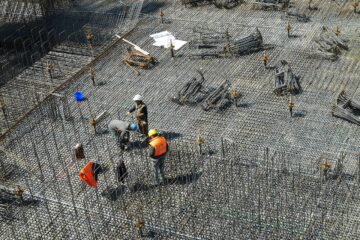![]()
Introduction:
The Initial Insolvency and Bankruptcy code was considered a historic moment in the corporate industry as it is the only complete law aimed at a quick solution to corporate shortages through a fixed, timely identification process. financial failure, and other such broad changes that were intended to increase business facilitation and protect the rights of creditors.
However, after the launch and many judicial decisions by code, some lacuna has emerged. The decision of the Supreme Court and the National Company Law Tribunal in the Jaypee Infratech case has raised suspicions that all stakeholders are covered under the umbrella law which means the IB Code.
Background
In 2007, Jaypee Infratech had proposed building 32,000 apartments and selling some plots in Noida. The flats were part of the Integrated Wish Town project located in Sectors 128, 129,131, 133, and 134 near the Noida-Greater Noida Expressway Jaypee Infratech, which developed the Yamuna Expressway circuit and the 165-kilometer Formula One, promised buyers that apartments to be built. launched in 2011-12. It has brought about 12,000 apartments and a few hundred sites.
But it has failed to bring about 20,000 apartments to its Wish Town and Jaypee Aman projects. The company also failed to repay a bank loan from the banking association On August 8, 2017, IDBI Bank applied to the National Company Law Tribunal (NCLT) to initiate a hearing on Jaypee Infratech’s default of Rs 526 crore.
In September 2017, a group of real estate agents went to SC with a letter of complaint. The case was labeled ‘Chitra Sharma and Others’. Many home buyers later included the issue. That same month, the Supreme Court instituted a process to resolve the financial crisis. It ordered the holding company of Jaiprakash Associates to deposit Rs 2000 crore in the court register on October 27, 2017.
In March 2018, the company invested only Rs 550 crore. The court ordered Jaiprakash Associates to deposit Rs 200 crore in two installments in May 2018. Between December and May 2018, Insolvency Resolution Professional invited bids from buyers interested in purchasing Jaypee’s goods for the project. Cube Highways, Suraksha, and Adani have been nominated as professional bidders. Cube Suraksha Realty is shortlisted as the highest bidder, but the Debt Committee has rejected the bid for technical reasons.
The Jaiprakash Associates decision-making process for this project has also been rejected for financial and technical reasons. NCLT also announced Jaiprakash Infratech’s move to borrow 758 hectares of land in exchange for a loan from a holding company as a counterfeit.
The dispute began with the collapse of JIL, when Mr. Anuj Jain applied to the National Company Law Tribunal, Allahabad Bench seeking to set aside JIL Mortgage based on creating
- work preferred,
- non-essential work and
- fraudulent transfers, under the relevant provisions of the IBC.
Although the NCLT agrees with these disputes, it was dismissed by the Court of Appeal, which led to an appeal that was eventually decided by the Supreme Court.
In June 2018, the Supreme Court ordered Jaiprakash Associates to file Rs 1000 crore. That same month, the government announced a new amendment to the IBC Code of Conduct. Homebuyers become financiers. But there was no clear indication that they were safe or unsecured lenders. They were treated in the same way as banks and institutional lenders and were part of the Debt Committee. They have been empowered to put together a solution to the problems of a real estate firm
The banks that were part of the COC CIRP-1 reviewed all bids and eventually rejected the Suraksha Reality bid, a reason given that the 7500 crores bid was less than the termination rate. During the intervention from Aug 2017 to August 2018 when SC was caught on the issue, NCLT Allahabad and NCDRC Delhi did not issue any orders.
The case WRIT PETITION (CIVIL) NO 744 OF 2017 was finally decided by SC on August 9, 2018, and the matter was returned to NCLT Allahabad. The 270 days Corporate Insolvency Resolution Process was rescheduled and CIRP-2 was restarted from 9 Aug 2018.
A New Consumer Committee was formed when homeowners had a 59% voting share. The IDBI lead consortium of banks and other financial institutions has a 40 percent voting share. The remaining 1 percent was held by the owners of a fixed deposit. The CIRP-2 process completed its 270 days from Aug 9, 2018, to May 6, 2019. This period is now extended by NCLT Allahabad until July 29, 2019. During these 270 days, the birds were processed. Various banks re-voted against a bid from Suraksha. Real estate agents voted on the application, but without the cooperation of the banks, the decision was unable to cover the required 66% of votes needed to pass the decision.
The banks took two weeks to negotiate a bid with the NBCC between May 17 and May 30, 2019, and the revised NBCC application was re-voted on May 31, 2019, for 10 days. Homebuyers buyers again voted for the NBCC in the next 10 days and on the day of the IDBI voting they went to NCLAT again to seek permission to vote against the NBCC. The court made it clear that it had never issued an order as to what they should vote for, which is why their application was not timely. Justice Mukhopadhaya said the order clearly stated that the voting result should be presented to the bench should the CoC decide to reject the NBCC application. The trial is scheduled for July 2, 2019
On July 30, NCLAT had approved a new bid for the moneyless Jaypee Infratech but barred its promoter Jaypee Group from participating in the auction. On August 22, the Supreme Court ruled that the situation continued for a week due to a lack of funding after the Jaypee Group challenged an order from the National Company Law Appellate Tribunal that allowed new bidding for Jaypee Infratech. NCLAT had barred its parent company, Jaypee Associates, from bidding. On September 3, the high court sought to know from the NBCC whether it was willing to submit a revised proposal to complete the suspended projects of Jaypee Group.
On September 5, 2019, the NBCC had agreed to submit a revised proposal to take over the unfinished units of the troubled company. During the trial, the Center told the court it would waive the tax, amounting to thousands of dollars, for Jaypee Infratech, if the NBCC would take over the company that was being sold.
On October 17, 2019, the NBCC submitted its revised resolution but it was revoked. Jaypee Infratech has insisted that its complaint be heard and that the proposal be considered. The SC will decide the matter on October 22, 2019.
Issues
On February 26, 2020, the Supreme Court ruled in Jaypee’s case, concluding a trial between two competing credit union groups, namely those filed by certain debtors of Jaypee Infratech Limited and others. of its company, Jaiprakash Associates Limited.
In its judgment, the Supreme Court considered two very important issues:
- That a loan created by JIL for the benefit of JAL lenders is an optional option under Section 43 of the Income and Debt Code, 2016; and
- That JAL lenders can be regarded as JIL’s `financial debtors’.
Impact on Insolvency Proceedings
Re-evaluation of third-party security transactions: Given the reasoning of the court while invalidating the JIL Mortgage, it is likely that resolution professionals, in ongoing insolvency proceedings will re-assess whether the NCLT should be approached under Section 43. It is also pertinent to note that the Supreme Court did not explain whether the JIL Mortgage was also avoidable under Sections 44 or 66 of the IBC and has kept those questions of law open – thereby also leaving the window open for resolution professionals to consider whether third party security transactions ought to be considered in light of these provisions (in addition to Section 43).
Re-composition of CoC: At the very least, this will lead to a re-composition of the committee of creditors and reclassification of the third party security beneficiaries as ‘other creditors’ of the relevant corporate debtor, resulting in a reduction in the ‘financial debt’ of the CoC and a lower threshold for approval by the CoC.
Treatment of ‘third-party security’ in resolution plans: The immediate question, which is likely to come up, is whether a resolution plan can contemplate the vacation of such third-party security interests. In our view, a resolution plan is unlikely to withstand judicial scrutiny if the beneficiaries of such third party security are not treated equally with other ‘secured’ financial creditors of the corporate debtor – given the court’s earlier ruling in the Essar case, which recognizes that “equitable treatment is to be accorded to each creditor depending upon the class to which it belongs: secured or unsecured, financial or operational”.
However, in cases where the ‘liquidation value’ of the third party security is higher than the payment to other ‘secured financial creditors, it can be argued that since this value would be available through liquidation of the corporate debtor, depriving them of the higher liquidation value in a resolution plan only on account of the third party security beneficiaries not being able to vote on a resolution plan is discriminatory.
Conclusion
This decision provided some important factors that participants should consider. The most important of these are:
- How the decision-makers and the ‘judicial authority’ use the provisions of Section 43 of the IBC to analyze special transactions and, in particular, how they view the Equality Restitution Act;
- The CoC will issue certain protected creditors and as a result, a small number of financial creditors will regulate the business processes for insolvency. However, if the distribution of proceeds to secured creditors is linked to their termination or non-discrimination in some way, this may result in immediate settlement processes with sub-committees of creditors; and
- Increased diligence and evaluation of lenders during the evaluation of financial proposals – in particular, formal financial proposals that include securities offered by group companies or involving other types of partnerships.
References:
- INDIA CORPORATE LAW, https://corporate.cyrilamarchandblogs.com/2020/03/the-jaypee-judgement-assessing-its-impact-on-the-indian-financing-landscape/ (last visited Nov. 5, 2021).
- IBC LAWS, https://ibclaw.in/jaypee-infratech-bankruptcy-case-the-final-bid-by-ms-g-vidya-kamath/ (last visited Nov. 5, 2021).
- BUSINESS STANDARD, https://www.business-standard.com/article/companies/jaypee-insolvency-irp-files-suraksha-group-s-resolution-plan-with-nclt-121070800723_1.html (last visited Nov. 6, 2021).
- MINT, https://www.livemint.com/Companies/j8sM2nvn5j0hdu81xNvRVJ/IRP-in-Jaypee-Infratech-case-invites-firms-to-submit-resolut.html (last visited Nov. 6, 2021).
- PRESS READER, https://www.pressreader.com/india/hindustan-times-lucknow/20180514/282016147971506 (last visited Nov. 6, 2021).



0 Comments